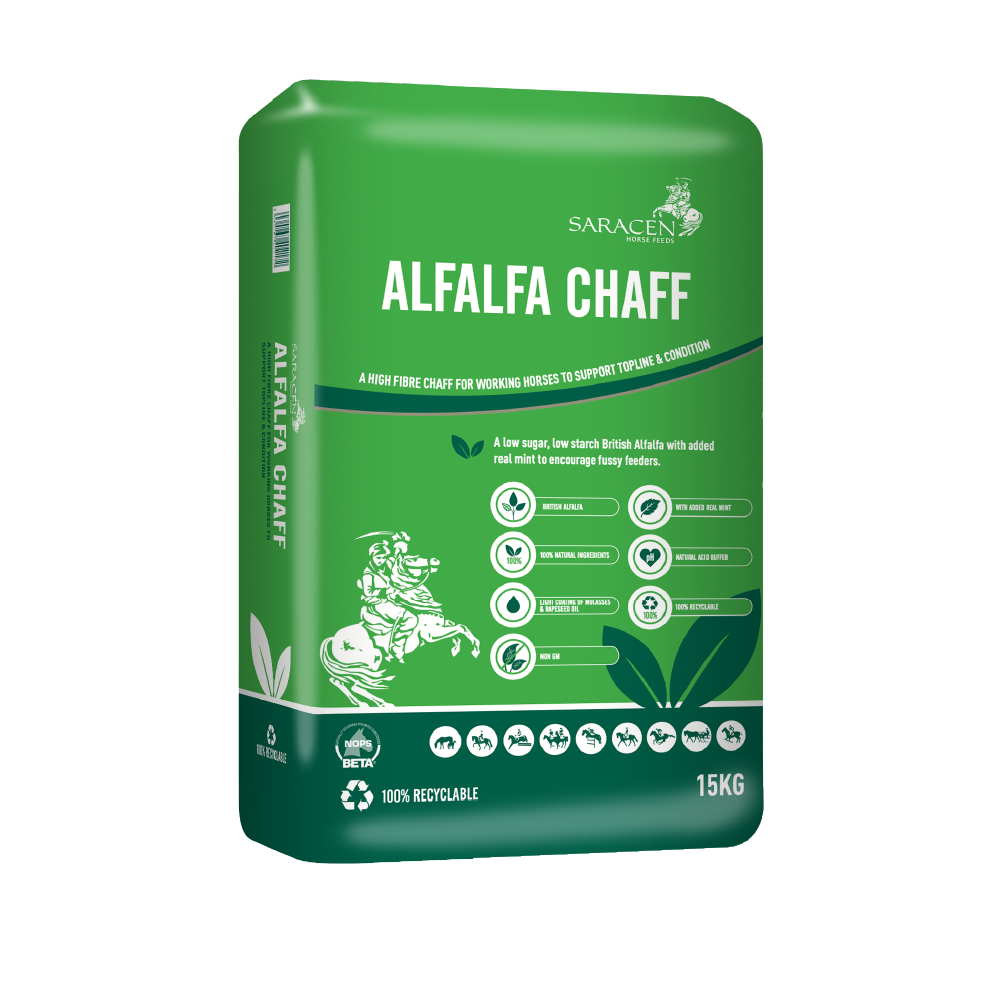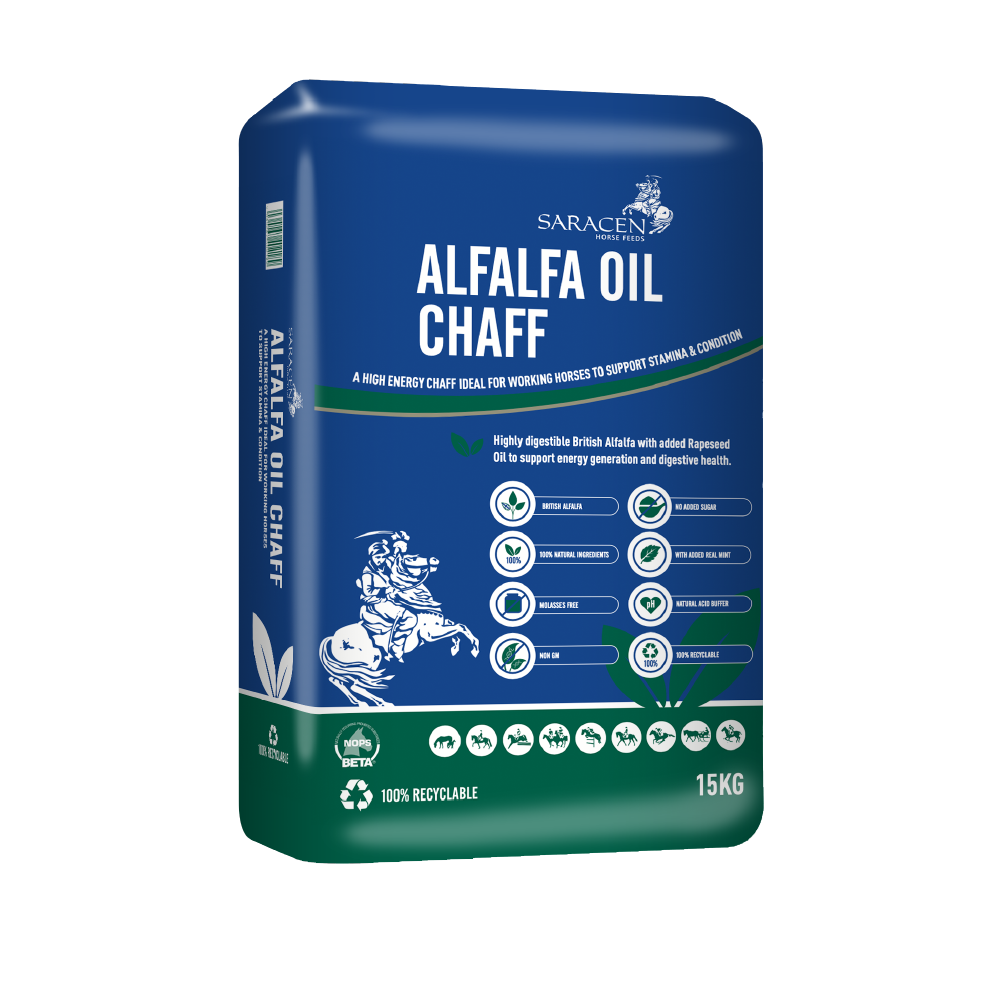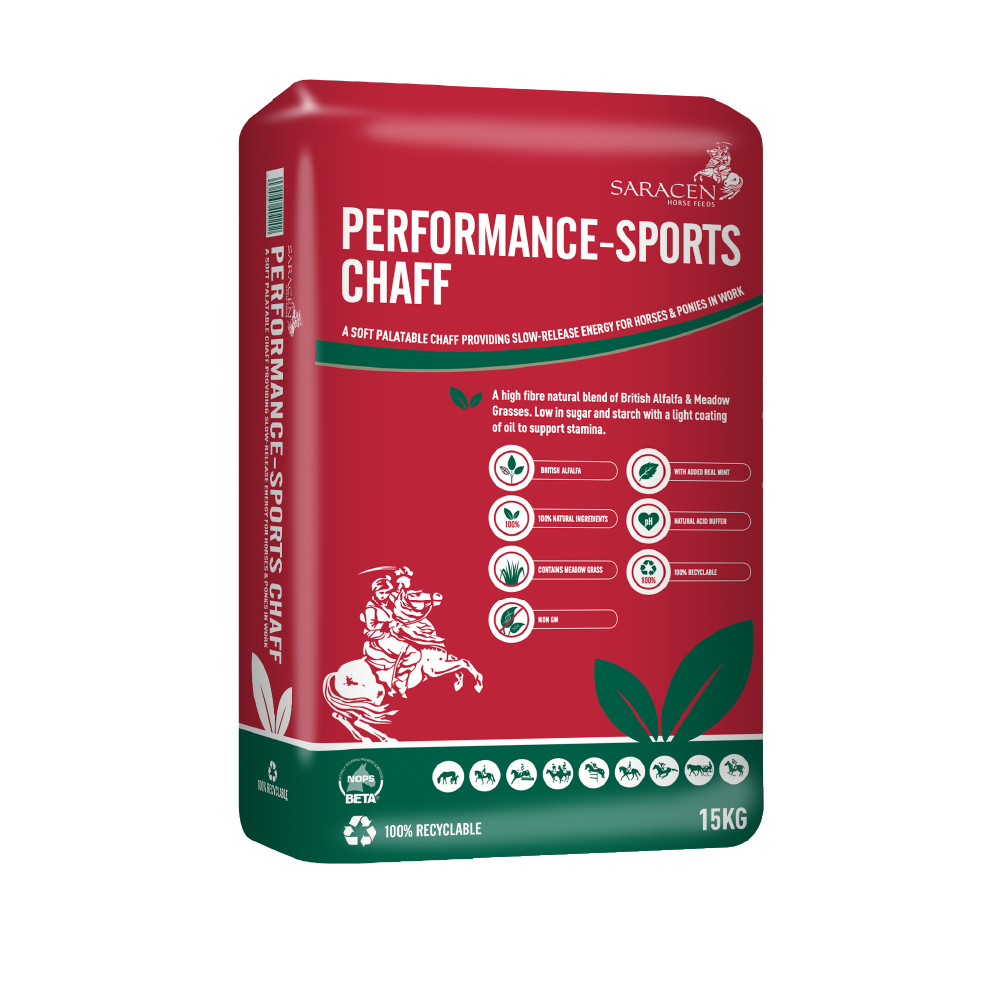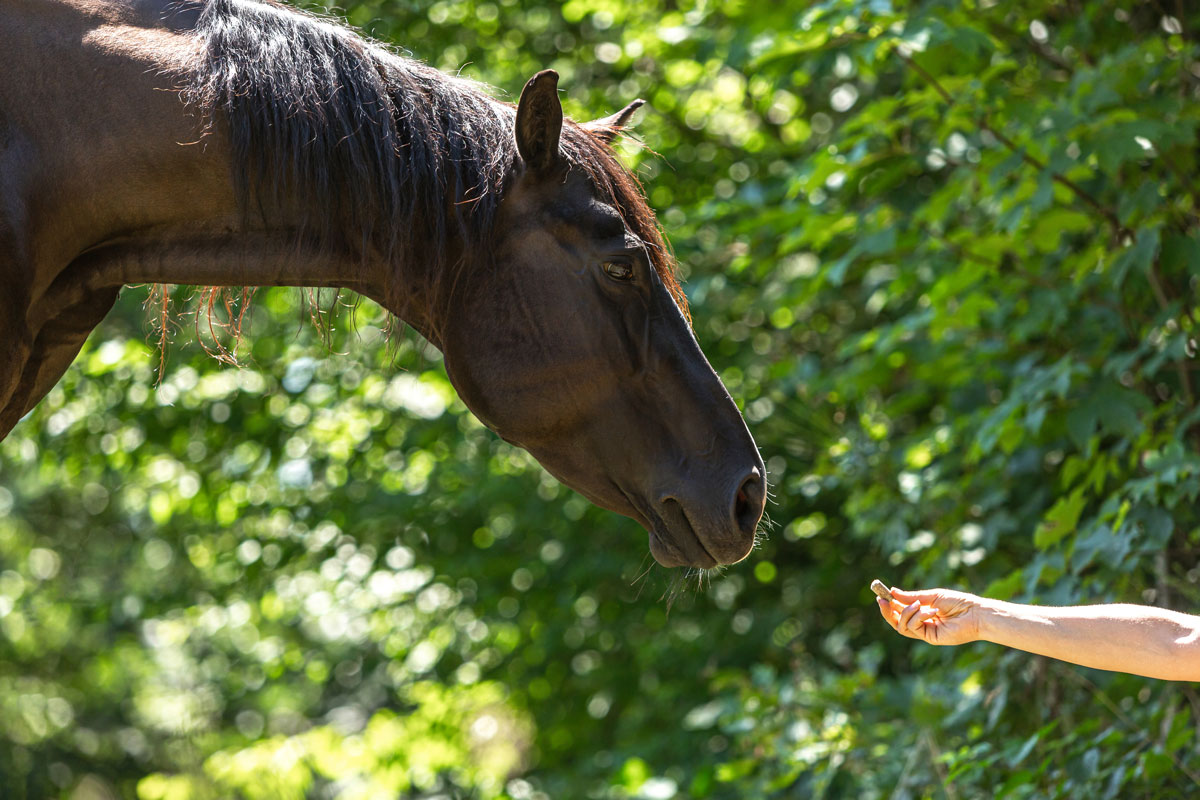Alfalfa for horses has always attracted wide interest among those involved in equine nutrition because, although it represents a highly nutritious forage, it is subject to debate regarding its complete suitability for each type of horse.
The intent of this guide is not only to dig deep into the role alfalfa plays in horse nutrition, highlighting both tangible benefits and possible contraindications depending on the specific context, but also to provide a comprehensive view that can assist owners, nutritionists and enthusiasts in making informed decisions.
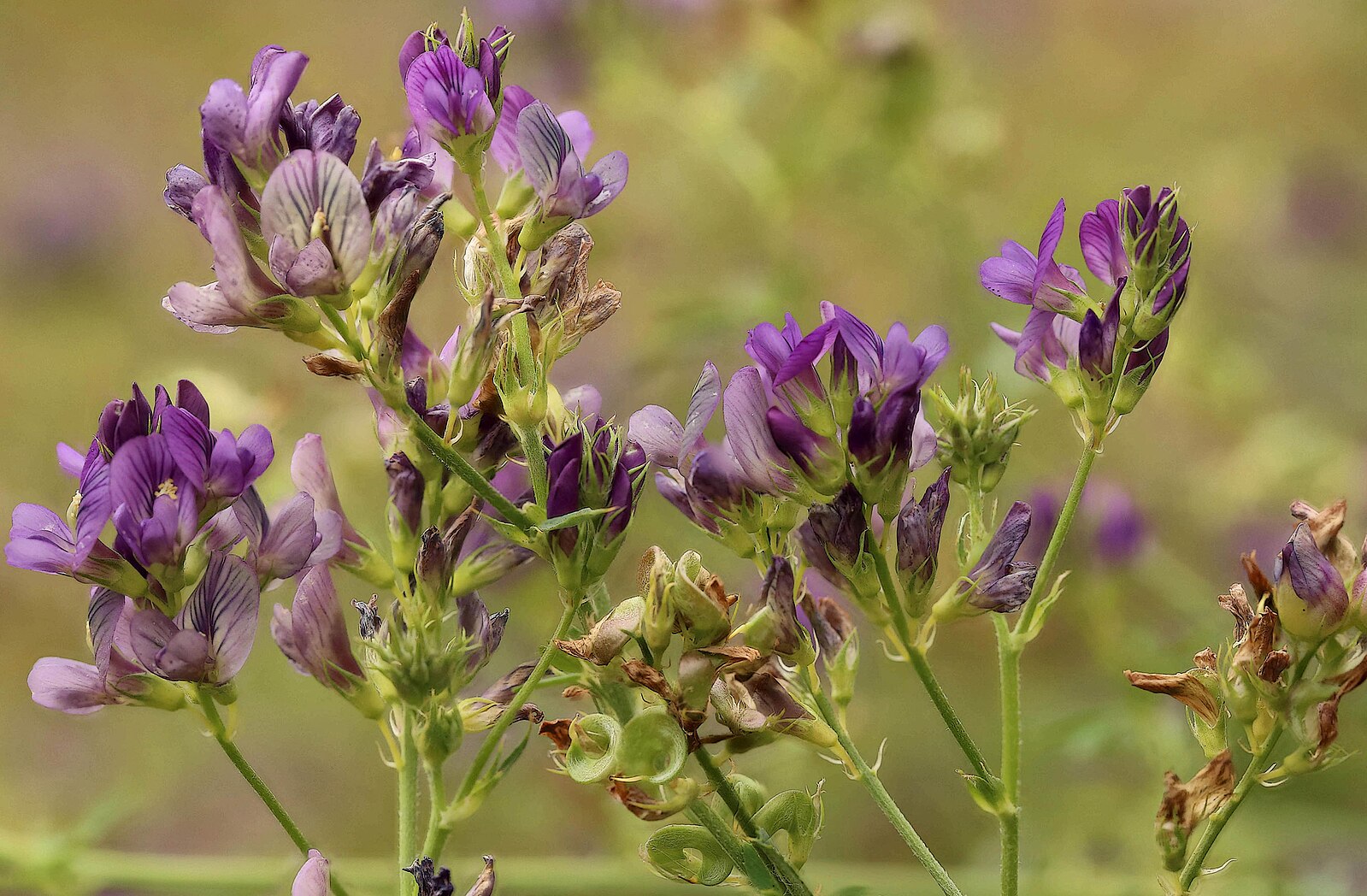
Medicago sativa, janet graham
Alfalfa: what it is and where it comes from
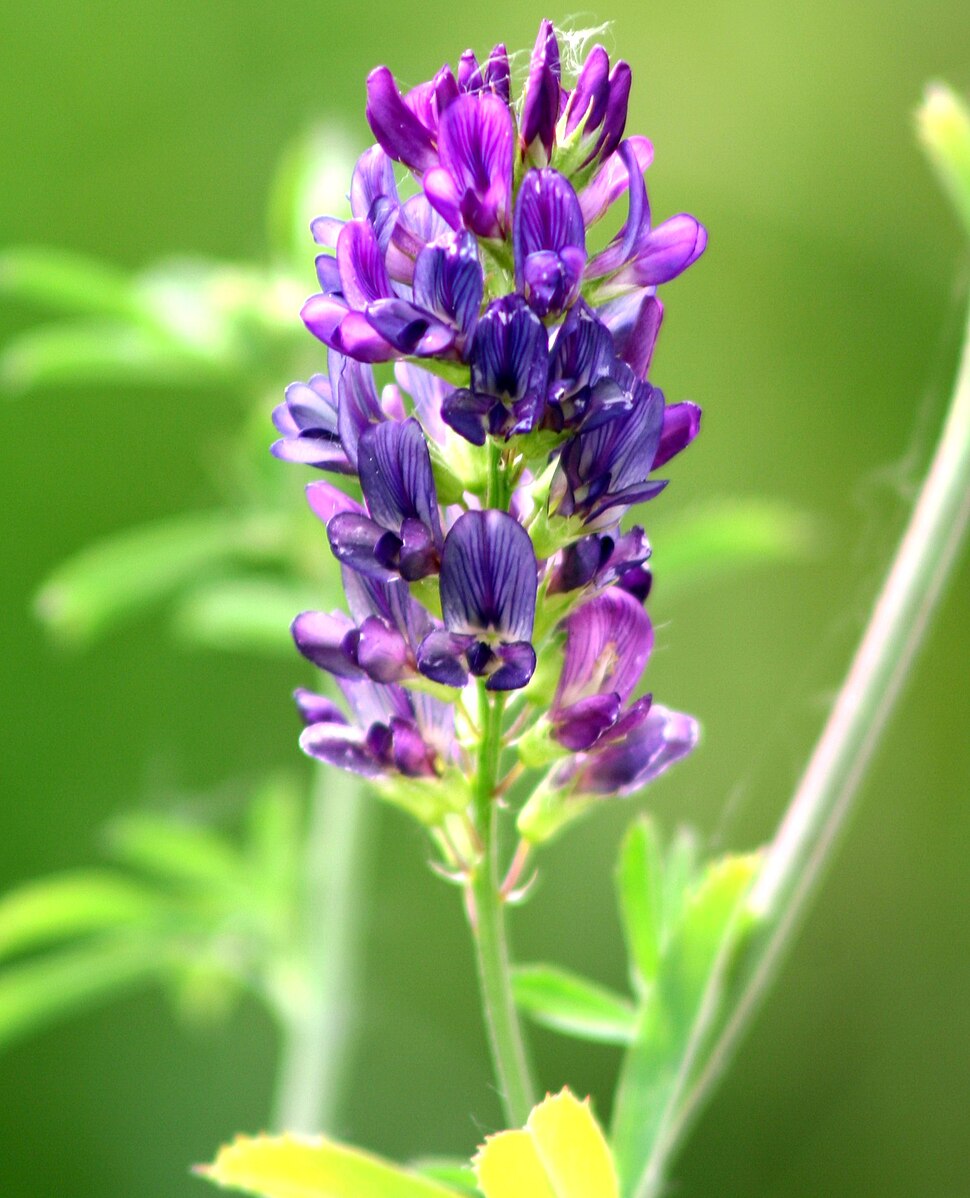
In categorizing forages for equine feed, two types of feed are distinguished: grasses and legumes. While the former include varieties such as tall fescue and bluegrass, the latter are part of the pea family and also include plants such as clover and alfalfa.
Alfalfa (Medicago sativa), specifically, is particularly valued for its high nutritional value as equine fodder. Also called Spanish grass, or alfalfa (from Arabic al-fáṣfaṣa “fodder”), it belongs to the Fabaceae (or Leguminosae) family and is native to the Mediterranean and southwest Asia.
Due to its yield (up to 27 tons of dry matter) and robust adaptability in arid environments, this plant has gained a stable place in equine diets worldwide. Although horse alfalfa is suitable for grazing, to preserve its efficiency and sustainability, it is essential to manage it by rotational grazing. This approach is necessary because, unlike other species such as bluegrass and teff, it shows less resistance to intensive grazing.
Alfalfa in horse feed: health advantages and disadvantages
Alfalfa as forage is widely known in equine circles but remains a hotly debated topic. Some concerns are indeed based on scientific evidence but also on hearsay and unverified traditions, making it crucial to carefully evaluate the impact of alfalfa on the equine diet.
Exploring the benefits and possible contraindications of administration is an important decision to ensure the health and well-being of horses.
Pros of Alfalfa in Horse Nutrition
This forage offers a number of significant and undeniable benefits for horses. The main benefits include first of all the presence of antioxidants, which are essential for equine well-being, but also multiple nutritional properties.
Low Starch and Sugar Content
Alfalfa, due to its low starch and soluble sugar content, emerges as an irreplaceable source of slow-release energy, ideal not only for maintaining general well-being but also for supporting athletic activity and weight gain in horses.
Its ability to offer an effective alternative to grain-based feeds proves critical for horses with particular sugar or carbohydrate sensitivities, such as those with insulin resistance or endocrine dysfunction.
Cereals such as oats, corn, and barley, which form the basis of many feeds, contain 55 percent to 75 percent carbohydrates, a decidedly high proportion for the horse’s digestive system. Some grass hays also have excessively high sugar content, thus pushing toward a diet based on legumes or a mix of legumes and grasses that can reduce total sugar intake.
Due to its balanced nutritional composition, which provides energy and fiber while minimizing sugar levels, alfalfa is established as an excellent feed option that can effectively promote equine well-being, thus meeting the needs of even the most sensitive individuals.
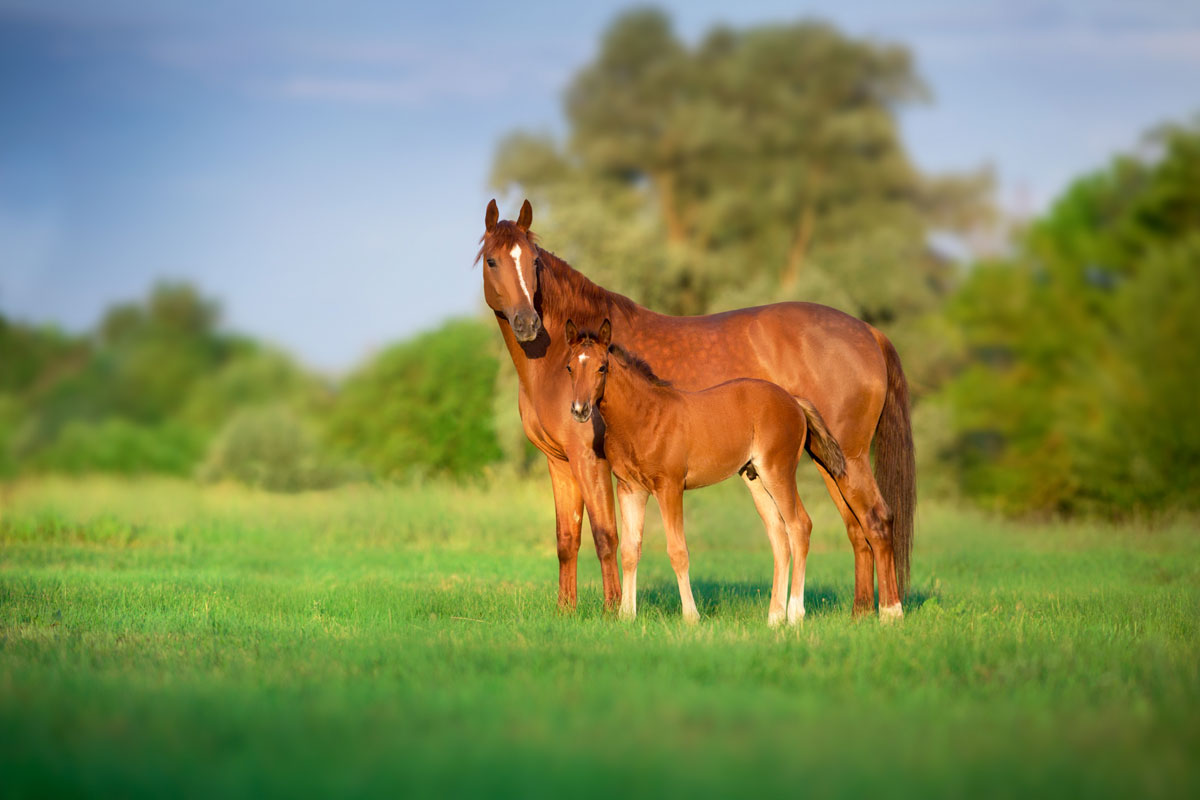
Quality protein source
Alfalfa is presented as a high-quality source of protein. It is in fact rich in essential amino acids, which are crucial for building and repairing muscle tissue, making it particularly beneficial for horses engaged in sport or reproductive activities, as well as for mares in the early stages of lactation. These show among the highest energy and protein requirements, and a diet rich in this forage ensures the production of quality milk to support growing foals.
The high nutritional value also makes alfalfa an ideal option for boosting nutrition in horses with reduced appetites. Compared with many forages, alfalfa is characterized by a higher content of digestible energy, crude protein and calcium, making it a valuable resource for underweight or recovering horses, as well as those engaged in intense training.
However, it is recommended in moderation for young, rapidly growing horses that have access to alternative sources to cover their protein and nutritional needs.
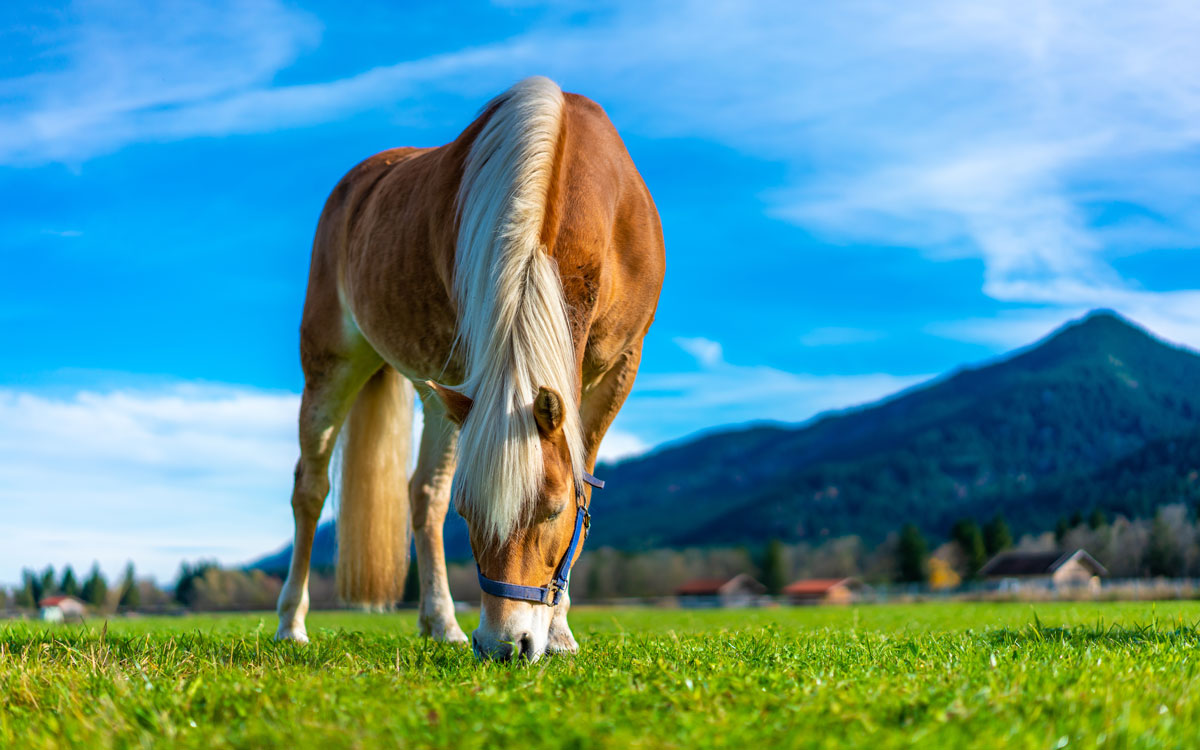
Bio-available minerals and vitamins
Alfalfa grass emerges as an abundant source of bio-available minerals, that is, minerals that are easily absorbed and exploited by the horse’s body. By enriching the diet with key nutrients such as calcium, magnesium, potassium, sulfur, iron, cobalt and zinc, it offers valuable support for equine health and well-being.
The high calcium content, especially in combination with phosphorus, is critical for promoting bone growth in growing horses.
Alfalfa provides a wealth of easily absorbed minerals for horses and is also a valuable source of vitamins. Chief among these are beta-carotene, which converts to vitamin A, vitamin E, and several B vitamins, including thiamine, riboflavin, pantothenic acid, biotin, and folic acid. In addition, the high cobalt content in alfalfa is critical because it helps horses synthesize vitamin B12, which is necessary for iron absorption and optimal energy utilization.
The cons of alfalfa for horses.
Despite the many benefits of alfalfa, it is important to consider situations in which this legume could instead prove harmful to the horse. It is also relevant to note, as mentioned above, that some of these concerns are not supported by scientific evidence.
In equine feeding, for example, hydrolyzable carbohydrates are carbohydrates that are digestible in the small intestine and capable of stimulating insulin release, unlike fructans. Alfalfa, often avoided because of its easily digestible carbohydrate content, actually has a lower carbohydrate content than many grass and cereal hays, making it suitable for metabolic horses such as those with Equine Metabolic Syndrome.
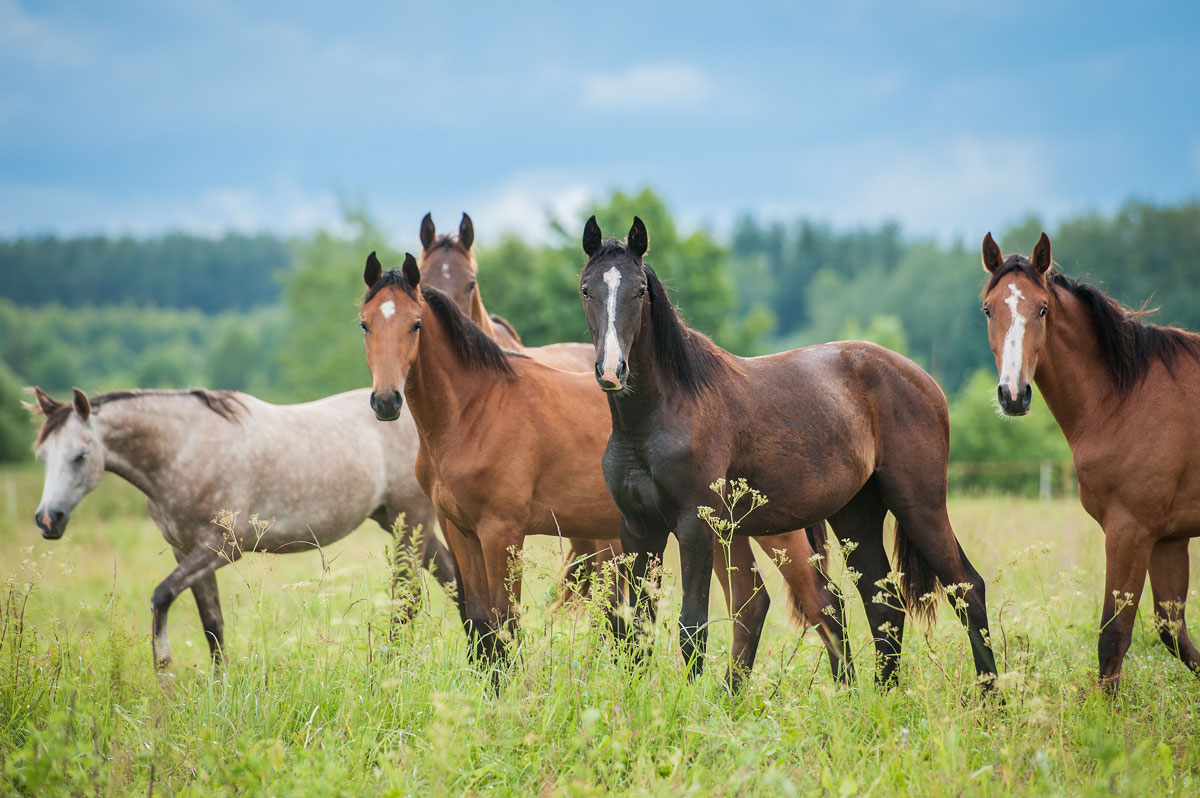
Calcium-phosphorus ratio and enterolith formation
One of the main concerns related to alfalfa feeding concerns the calcium-phosphorus ratio. As mentioned above, alfalfa has a higher calcium content than phosphorus, leading to a ratio that is too high if the diet is balanced incorrectly.
Most adult horses tolerate a calcium-to-phosphorus ratio of up to 9:1, while growing horses tolerate a 6:1 ratio as long as phosphorus requirements are met. To ensure that the calcium-phosphorus ratio remains within recommended limits, it may be necessary to reduce other sources of calcium in the diet or add sources of phosphorus. Foods such as beet pulp are low in phosphorus and high in calcium; therefore, they may need to be reduced when administering large amounts of alfalfa. Foods such as wheat bran, distillers grains, and supplements can be used to increase phosphorus intake and balance the diet.
Another risk associated with feeding high amounts of alfalfa (above 50%-70% of dry matter) is the formation of enteroliths. Enteroliths are mineral stones that form in the intestines when a horse ingests an indigestible foreign object such as sand.
Horses fed alfalfa-rich diets have higher mineral concentrations in the colon and lower colonic pH, which could explain the increased risk of enterolith formation.
However, most horses fed an alfalfa-rich diet do not develop enteroliths, so the increased risk may not be due solely to alfalfa consumption. Other factors such as lack of access to pasture and excessive mineral intake could contribute to enterolith formation. Some breeds, such as Arabs and their crosses, may be more prone to stone formation. In this case, therefore, it would be better to target other mineral sources.
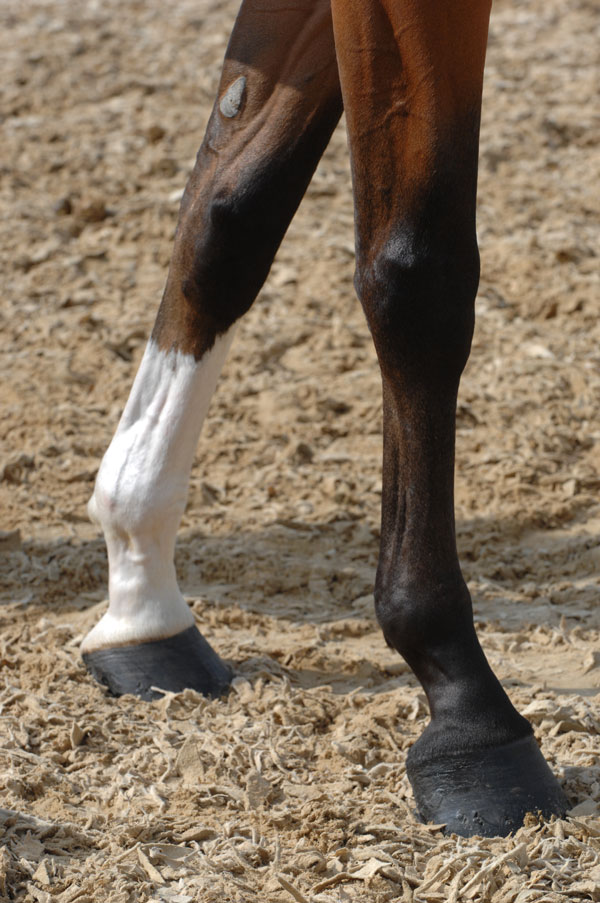
Laminitis and hoof sensitivity
Some empirical observations suggest that some horses predisposed to laminitis may be sensitive to the introduction of alfalfa into their diet. Although the reason for this reaction is unclear, it may be related to high protein intake from alfalfa hay.
Excess protein can alter the function of the large intestine, affecting gut health and inflammation. In addition, high levels of amino acids in the blood after taking alfalfa can stimulate insulin secretion, increasing the risk of laminitis. If your horse is prone to this condition, it may be worth considering switching to grass hay if you notice increased foot sensitivity while feeding alfalfa.
Respiratory infections
Some horse owners have expressed concerns that alfalfa hay may cause respiratory problems for their animals. However, it is not alfalfa directly that causes this problem, but the presence of dust or mold in any kind of hay, which can worsen respiratory conditions such as asthma.
The dustiness of hay is usually related to its moisture content: alfalfa hay is drier and tends to be dustier because the leaves are more brittle. Although this is generally packed with a higher degree of moisture than grass hay, improper storage or handling could promote the formation of mold and mycotoxins, potential sources of respiratory tract irritation.
It is always recommended to check each type of forage for dust and mold. In case of dusty hay, the best solution is purification and related sterilization with the hay purifiers to reduce respiratory irritants. Paying attention to dark or grayish spots in the hay, signs of mold, and avoiding feeding such forage always remains the best advice.
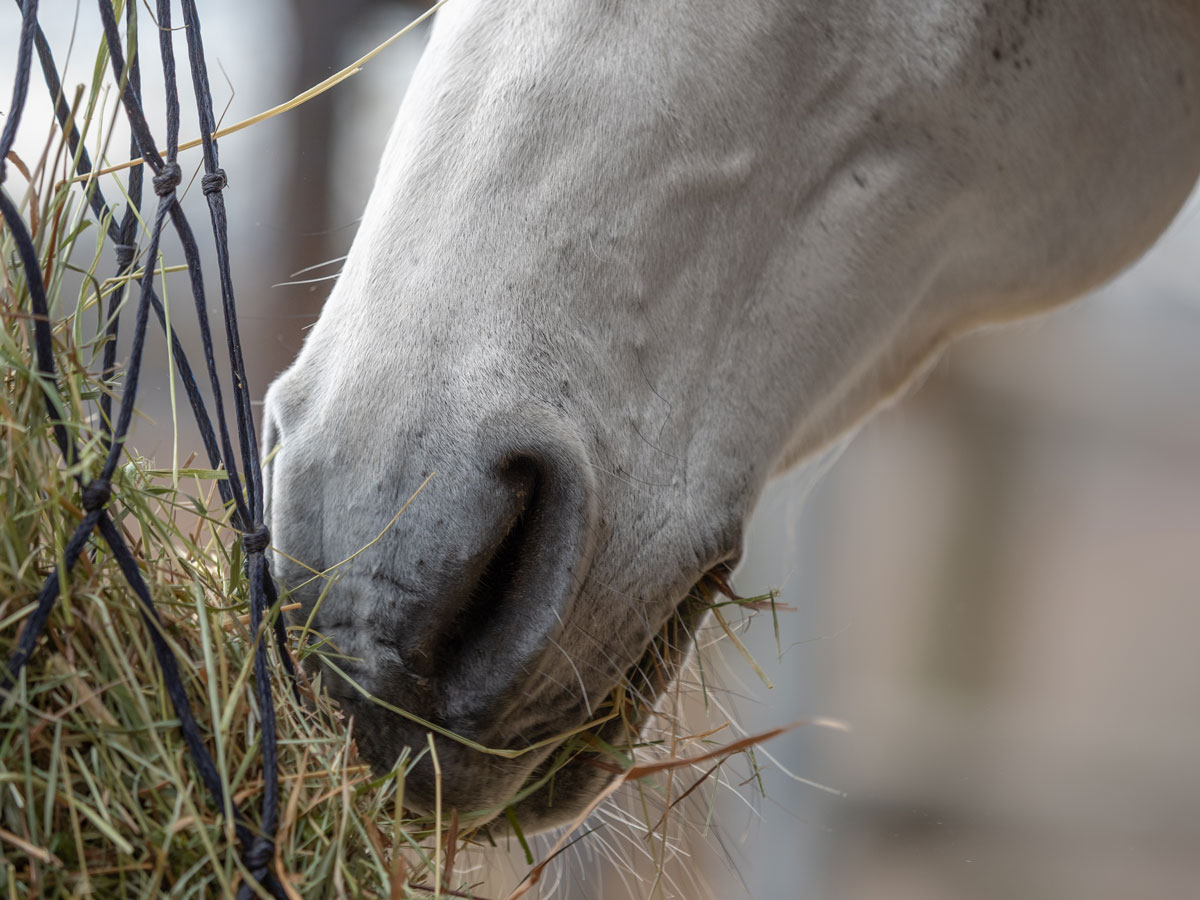
How much alfalfa can my horse eat? The advice of Harrison Horse Care
The ideal amount of alfalfa to give your horse can be complex to determine. Usually alfalfa works best as supplemental hay and can be added to regular grass hay to help the animal achieve the recommended daily requirement of vitamins, nutrients and protein.
In the Harrison Horse Care shop you can find products made from the best English alfalfa for your horse, which is lighter, safer and more digestible than the version grown in Italy with our climates and soils.
Discover our mixes for your horse’s well-being.
